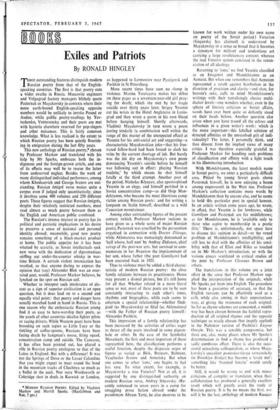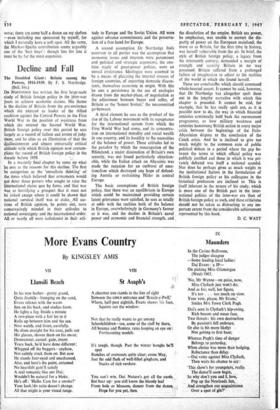Exiles and Patriots
By RONALD HINGLEY
Russian poetry from that of the English- speaking outstanding features distinguish modern speaking countries. The first is that poetry cuts a wider swathe in Russia. Muscovite engineers and Volgograd factory managers blithely quote Pasternak or Mayakovsky in contexts where their more earth-bound English-speaking opposite numbers would be unlikely to invoke Pound or Auden; while public poetry-readings by Yev- tushenko, Voznesensky and their peers are met with hysteria elsewhere reserved for pop-singers and other nuisances. This is fairly common knowledge. What is less realised is the extent to which Russian poetry has been quietly flourish- ing in emigration during the last fifty years.
This new anthology of Russian poetry,* chosen by Professor Markov and translated with his help by Mr Sparks, embraces both the in- digenous and the foreign-grown article, and one of its effects may well be to rescue the latter from undeserved neglect. Besides the work of many distinguished individual performers, among whom Khodasevich and George Ivanov are out- standing, Russian émigré verse makes quite a corpus even if judged only quantitatively; since it involves some 400 volumes and 250 different poets. These figures suggest that Russian émigrés, despite their relatively restricted numbers, must read almost as much poetry between them as the English and American public combined.
The Russian's intense interest in poetry has its political and patriotic implications in his desire to preserve a sense of national and personal identity abroad; meanwhile, good new poetry remains something of a black-market product at home. The public appetite for it has been whetted by scarcity, as Soviet intellectuals seek new verse with the dedication of dipsomaniacs sniffing out under-the-counter whisky in war- time Britain. A certain violent intoxication has resulted, so that anyone daring to express the opinion that (say) Alexander Blok was an over- rated poet, would, Professor Markov believes, be lynched on the spot on Russian soil.
Whether to interpret such intolerance of .dis- sent as a sign of superior civilisation is an open question, but it does lead on to a second and equally vital point: that poetry and danger have usually marched hand in hand in Russia. This is one reason why the enthusiastic Russian young find it so easy to- hero-worship their poets, as the youth of other countries idealise fighter pilots or racing drivers–While Western poets have been brooding on such topics as Little Lucy or the tinkling of coffee-spoons, Russians have been facing death by hangman's noose, firing squad, concentration camp and suicide. The Caucasus, it has often been pointed out, has played a role in Russian poetry analogous to that of the Lakes in England. But with a difference! It was not the Springs of Dove or the Lesser Celandine that you might expect to meet round the bend in the mountain tracks of Chechnya so much as a bullet in the neck. Nor were Wordsworth or Coleridge shot in duels in Keswick or London,
* MODERN Itussuilv PoEritv. Edited by Vladimir Markov and Merrill Sparks. (MacGibbon and Kee, 5 gns.)
as happened to Lermontov near Pyatigorsk and Pushkin in St Petersburg.
More recent times have seen no slump in violence. Marina Tsvetayeva makes her debut on these pages as a seventeen-year-old girl pray- ing for death; which she met by her tragic suicide over thirty years later. Sergey Yesenin cut his wrists in the Hotel Angleterre in Lenin- grad and then wrote a poem in his own blood before hanging himself. Shortly afterwards, Vladimir Mayakovsky in turn wrote a poem jeering tenderly (a combination well within the range of this master of the unexpected effect) at Yesenin for his anti-social act and suggesting—a characteristic Mayakovskian joke—that his frus- trated fellow-bard had been forced to slash his veins by the current shortage of ink. But barely was the ink dry on Mayakovsky's own poem denouncing Yesenin's suicide before he himself was following suit in effect: playing `Russian roulette,' by which means he shot himself fatally at the third attempt. Another poet of the period, Nicholas Klyuyev, also apostrophised Yesenin in an elegy, and himself perished in a Soviet concentration camp—as did Osip Man- delstamm, who became the most illustrious camp victim among Russian poets: and for writing a lampoon on Stalin himself, described as a wild Caucasian mountaineer.
Among other outstanding figures of the present century (which Professor Markov reckons to have given us a whole score of major Russian
poets), Pasternak was crucified by the persecution organised in connection with Doctor Zhivago,
while Akhmatova was menacingly denounced as 'half whore, half nun' by Andrey Zhdanov, chief satrap of the post-war arts; but survived to com-
memorate in her Requiem the imprisonment of her son, whose father (the poet Gumilyov) had been executed back in 1921.
Thus to violence must be added a third charac- teristic of modern Russian poetry: the close family relations between its practitioners. Home may present a dismal picture, but it's still home for all that. Whether related in a more literal sense or not, most of these poets are to be seen constantly interacting to each other's tones, rhythms and biographies, while each seems to entertain a special relationship—whether Oedi- poid (as Mayakovsky) or filial (as Akhmatova) —with the Father of Russian poetry himself: Alexander Pushkin.
This impression of a family relationship has been increased by the activities of critics eager to thrust all the poets involved in some pigeon- hole or other. In the case of the Symbolist Movement, the first and.most important of those represented here, the classification performs a useful function, despite the disparate urges of figures as varied as Blok, Bryusov, Balmont, Vyacheslav Ivanov and Annensky. But when one comes to other isms,' one begins to feel less sure. To what extent, for example, is Mayakovsky a true Futurist? Not at all, it is suggested by one distinguished authority on modern Russian verse, Andrey Sinyaysky. (Re- cently sentenced to seven years in a camp for smuggling prose fiction abroad under the pseudonym Abram Tertz, he also deserves to be known for work written under his own name on poetry of the Soviet period.) Futurism (Sinyaysky has claimed) is understood by Mayakovsky in a sense so broad that it becomes a synonym for militant and tendentious art
carrying a large revolutionary content; whereas the real Futurist system consisted in the renun- ciation of all ideology.
Reverting to 'isms,' we find Yesenin classified as an Imaginist and Mandelstamm as an Acmeist. But when one remembers that Acmeism
represented a revolt against Symbolism in the direction of precision and clarity—and then, for
heaven's sake, calls to mind Mandelstamm's writings with their tantalisingly elusive multi- decker levels—one wonders whether, even in the
sphere of literary criticism or Soviet affairs, words have ever been quite so defiantly stood on their heads before. Another question also arises when you have traced all the echoes and influences in a given writer's work : which is the more important—this labelled solution of detected affinities or the unresolved grit of indi- viduality? The latter, I personally think, and thus dissent from the implied views of many critics. I was therefore especially grateful to Professor Markov for handling such problems of classification and affinity with a light touch in his illuminating introduction.
With Mandelstamm, the latest modish name in Soviet poetry, we enter a particularly difficult area. Prized by young Soviet poets above Pasternak himself, he is now enjoying a boom among cognoscenti in the West too. Professor Markov's collection contains more words by Mandelstamm than by anyone else, and he seems to hold this particular poet in special honour. In an article written some years ago, he wrote, in effect, that Yesenin is for lowbrows, while Gumilyov and Pasternak are for middlebrows; as for Mandelstamm, he is 'available only to those who aspire to membership in a poetic elite.' There is, unfortunately, not space here to discuss this opinion in detail—or the vexed problem of Mandelstamm's intelligibility; and still less to deal with the affinities of his sensi- bility with that of Eliot and Rilke as touched on in Mr Markov's introduction; or with the various cruces ventilated in critical studies of the poet by Professor Clarence Brown and others.
The translations in this volume are a joint effort in the sense that Professor Markov sup- plied the interpretation of the originals, while Mr Sparks put them into English. The procedure has been a guarantee of accuracy, so that the English versions can be effectively used as a crib, while also aiming, in their unpretentious way, at giving the resonance of each original. So far as rhyme-schemes are concerned, a middle way has been chosen between the faithful repro- duction of all original rhymes and the opposite technique so wisely chosen (but ineptly applied) in the Nabokov version of Pushkin's Eugene Onegin. This was a sensible compromise, but there are, alas, many places where Mr Sparks's determination to find a rhyme has produced a sadly cumbrous effect. There is also the occa- sional screeching colloquialism, as where Maya- kovsky's succulent pomeshayshysya veruyushchy (in Brooklyn Bridge) has become a 'crazy nut'; something like 'frenzied fanatic' would surely be better.
Still, it would be wrong to end with minor criticisms of compiler or translator, when their collaboration has produced a generally excellent result which will greatly assist the study of Russian poetry. It is by no means the first, nor will it be the last, anthology of modern Russian
verse; there are some half a dozen on my shelves —even including one sponsored by myself, for which I naturally have a soft spot. All the same, the Markov-Sparks contribution seems arguably one of the 'best buys': though line for line it must be by far the most expensive.































 Previous page
Previous page